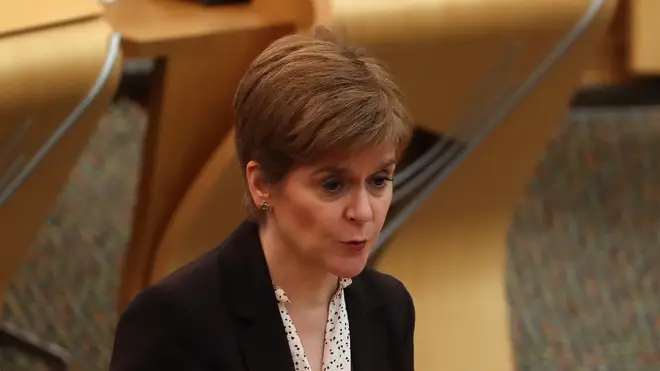
Richard Spurr 1am - 4am
7 October 2020, 18:09

Nicola Sturgeon has announced new restrictions across Scotland in a bid to contain the virus, but what are they?
On Wednesday afternoon, the First Minister announced new restrictions on the hospitality sector, with pubs and restaurants and bars banned from selling alcohol indoors.
Ms Sturgeon said that indoor hospitality venues will only be allowed to operate between 6am and 6pm daily, selling food and non-alcoholic drinks only.
Here's what the new rules are and how they could affect people in Scotland.
New restrictions have been placed on the hospitality industry across Scotland, with harsher changes made in the central belt.
Ms Sturgeon said that indoor hospitality venues will only be allowed to operate between 6am and 6pm daily, selling food and non-alcoholic drinks only.
Outdoor bars, restaurants and cafes will be allowed to remain open up until 10pm and will be allowed to sell alcohol up to that time.
The restrictions will come into force at 6pm on Friday and are intended to end after October 25.
However, all licensed premises in the Greater Glasgow and Clyde, Lanarkshire, Ayrshire and Arran, Lothian and Forth Valley health board areas will be closed for both indoor and outdoor operations.
Cafes without a licence to sell alcohol will be allowed to open until 6pm, the First Minister said, to counter social isolation.
Read more: Thousands of scientists sign 'anti lockdown petition' calling for return to herd immunity

Nicola Sturgeon- Coronavirus testing in Scotland will be expanded
Scots will now be expected to wear a mask in communal settings such as workplace canteens, corridors and break rooms.
Shops will be expected to follow strict two-metre social distancing rules again with one-way systems to be introduced.
Ms Sturgeon said: "We hope that the restrictions already in place and those I have announced today will stem the increase in new cases. However, that is down to all of us.
"The more we comply, the more effective they will be. It is also important that we use the next two weeks to prepare, protect and prevent - to further strengthen our resilience and our ability to live alongside this virus. So we will also take the following steps.
"Firstly, we will introduce regulations to extend the mandatory use of face coverings in indoor communal settings.
"This will include, for example, staff canteens and corridors in workplaces.
"We will take action to strengthen compliance with the different strands of the FACTS advice - focusing on areas where we know from research that compliance is not yet high enough, for example, the need to self-isolate.
"I can also confirm that, from this weekend and across Scotland, we are asking shops to return to two-metre physical distancing and reintroduce the mitigations they put in place earlier in the pandemic - for example, one way systems in supermarkets."
People in the central belt of Scotland have been asked to avoid public transport unless absolutely necessary in the next two weeks.
First Minister Nicola Sturgeon announced that those in the five health board areas should only use public transport when travelling to work, school or other unavoidable reasons.
While a travel restriction is not being enforced on people in the central belt, Ms Sturgeon urged those living in these areas not to travel beyond their own health boards.
Listen & subscribe: Global Player | Apple Podcasts | Google Podcasts | Spotify
Ms Sturgeon said she was "grateful" for the work done by hospitality businesses to stop the spread of coronavirus, as she announced tough new measures.
Speaking to MSPs, the First Minister said: "However, the evidence paper published today sets out why these settings present a particular risk.
"The R number seems to have risen above 1 approximately three weeks after the hospitality sector opened up.
"We know that more than one fifth of people contacted by test and trace, report having visited a hospitality setting."
She added: "All of these reasons, significantly restricting licensed premises for 16 days temporarily removes one of the key opportunities the virus has to jump from household to household.
"It is an essential part of our efforts to get the R number significantly below 1."
Ms Sturgeon also alleges that the new stringent measures have been put in place to ensure there will not be a full lockdown in the future.
She said: "These new restrictions will last for 16 days. They are intended to be short, sharp action to arrest a worrying increase in infection.
"However, although they are temporary, they are needed.
"Without them, there is a risk the virus will be out of control by the end of this month.
"But with them, we hope to slow its spread. That will help to keep schools and businesses open over the winter. And it will save lives."
However, despite the rise in infections, the amount of Covid-linked deaths remains low compared to the virus peak in April.
Data published by the National Records of Scotland (NRS) on Tuesday showed there were 20 registered deaths where Covid-19 was mentioned on the death certificate in the week ending October 4. This is an increase of 10 deaths from the previous week.
According to the report, six occurred in care homes while 13 were in hospitals with one in another institution.
Pete Whitehouse, NRS director of statistical services, said the figures show the number of people dying from Covid-19 “remains low” especially when compared to the peak week in mid-April when 661 Covid-19 related deaths were registered.
As of October 7, there have been 1,054 cases of Covid-19 reported.
Read more: Scottish students banned from pubs and restaurants